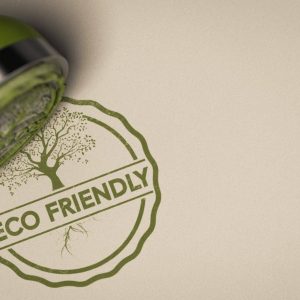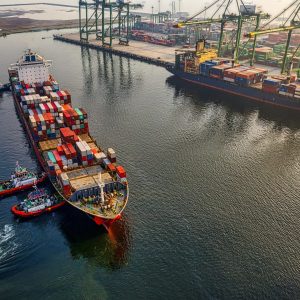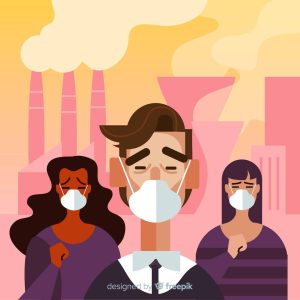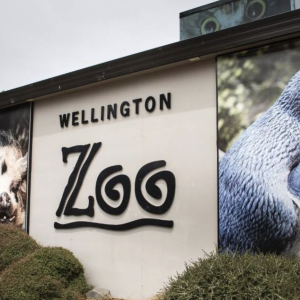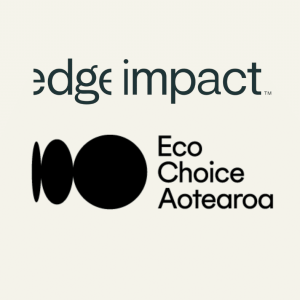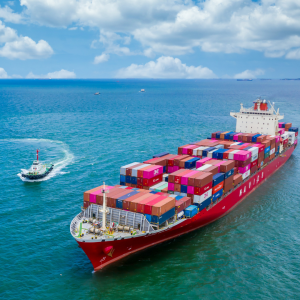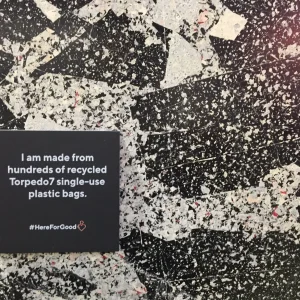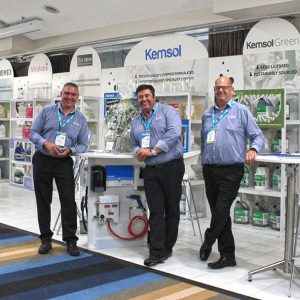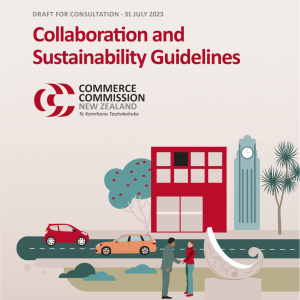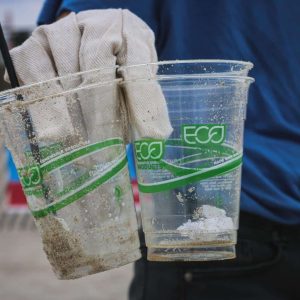Stay informed with our latest news and insights on sustainability and green innovation.
Learn about issues affecting our environment, the industry game-changers who are making a difference and solutions you can be part of. To get freshly published news, articles and resources delivered straight to your inbox, subscribe to our newsletter.
Filter by Type
Eco Choice Aotearoa has joined forces with GS1 New Zealand to advance traceability across New Zealand’s manufacturing and supply chains. By leveraging GS1’s 2D barcodes and Digital Link standards, this partnership will enable verifiable sustainability information, such as sourcing claims,...
Last Friday, our team had the pleasure of visiting NZ Panels Group at their state-of-the art facility in East Tamaki for a behind-the-scenes tour. NZ Panels Group currently have 11 products certified with Eco Choice, under their brands Prime Panels,...
The Government spends NZD$51.5 billion every year on buying goods and services. That’s 20% of our GDP. It’s a hugely powerful lever for transitioning New Zealand to a low-emissions, circular economy and ensuring a thriving environment for future generations. The...
In 2019, the Dutch central government launched its procurement strategy, “Procurement with Impact“. Their goal was to create climate-neutral business operations by 2030 and make ten key sectors fully circular by 2023 through strategic procurement. One of those sectors included...
An adaptation of this opinion piece by CEO Laura Gemmell was published here. Last April, the Consumer Guarantees Act (Right to Repair) Amendment Bill was plucked from the parliamentary lucky dip to the delight (and quite frankly, surprise) of advocates...
Written by Kate Hall (Ethically Kate) and commissioned by Eco Choice Aotearoa, this post was originally published here. Businesses are finally starting to take responsibility for their impact and listen to the environmental values of their customers. While some are...
Our recent submission for Aotearoa New Zealand’s second Nationally Determined Contributions (NDC2) highlighted the critical role Sustainable Public Procurement (SPP) can play as a high-impact, emissions reduction tool. What is Sustainable Public Procurement? SPP focuses on leveraging government purchasing power...
It’s that time of year again, Santa. The pōhutukawa trees are blooming, homemade decorations are going up and here in the office, we’re planning a low-waste party to celebrate with friends. But apart from some magical abilities to keep our...
When Eco Choice Aotearoa rebranded (from Environmental Choice NZ) it wasn’t just about aesthetics. We wanted to communicate our mission, who we are and what we stood for. As part of that, for the first time in the ecolabel’s history,...
New Zealand is stepping into the global spotlight with its involvement in the Agreement on Climate Change, Trade, and Sustainability (ACCTS). This forward-thinking agreement weaves together trade liberalisation and environmental priorities, a bold move to align economic growth with the...
Environmental injustice and Racism: The Consequences The most glaring consequence of environmental racism and environmental injustice is the impact on the health of affected communities. Communities exposed to environmental risks (and denied access to environmental benefits) have a higher risk...
In today’s climate, where conversations about climate change, the environment and social justice can quickly spiral into a firestorm of insults, misinformation, and hurt feelings, I find myself asking two questions: 1. How can we have a productive conversation about...
The New Zealand Green Building Council’s new and improved Green Star has launched in Aotearoa – but what does that mean for manufacturers and suppliers? Eco Choice Aotearoa has put together a quick guide to help you get your head...
The country’s official ecolabel Eco Choice Aotearoa is proud to announce a new partnership with Edge Impact, Australasia’s leading provider of Environmental Product Declarations (EPDs). Eco Choice Aotearoa, trademarked by the Minister for the Environment, has been a pioneer in...
3rd of July, 2024: The country’s official ecolabel Eco Choice Aotearoa, is welcoming the first-of-its-kind Agreement on Climate Change, Trade and Sustainability (ACCTS). The innovative deal involving Aotearoa New Zealand, Costa Rica, Iceland, and Switzerland aims to make a meaningful...
What would you say if I told you there was a way to cut costs, generate jobs, protect the environment and make good on our international obligations? I’m not selling snake oil, just advocating for a little something called Sustainable...
Will & Able has always been committed to creating environmentally preferable cleaning products, grounded firmly in the concept of a circular economy. In just three months, they completed the certification process and synchronied it with the launch of their refreshed...
30 years ago, Chemical Solutions were founded on a bit of a radical notion: that a company can be successful in a marketplace by developing and manufacturing safe and environmentally responsible cleaning products. However, they knew that formulating great cleaning...
It’s thought the first New Years’ resolutions originated around 4,000 years ago with the ancient Babylonians making promises to repay their debts and return borrowed items to their rightful owners. And while many of us now opt for 12-month gym...
A lot of things that have surprised me at COP28. The weird little electric train that looks like it belongs at Rainbow’s End, transporting suited and booted delegates from one end of Expo City to the other. Walking smack bang...
There hasn’t been a lot to celebrate at COP28 over the past 24 hours. To keep global warming to 1.5 degrees Celsius, the countries that make up the Conference of the Parties, needed to agree on a phase-out of fossil...
The country’s official ecolabel is calling on Consumer NZ to modernise its approach to product testing, and provide much-needed context when comparing environmentally-preferable products with standard items. Eco Choice Aotearoa has certified products and services for more than 30 years,...
Eco Choice Aotearoa has submitted feedback on the Commerce Commission’s draft Collaboration and Sustainability Guidelines. The guidelines are intended to ensure ‘sustainability’ is not used as an excuse for anti-competitive behaviour. However, the ecolabel is concerned in their current form,...
– If your company relies on exploiting people to be profitable, you shouldn’t be in business – If you don’t have the time or inclination to conduct due dilligence on your suppliers, you shouldn’t be in business. – If you...
Aotearoa New Zealand has a problem with greenwashing, and seemingly, no plans to remedy it. This comes at considerable cost to consumers, businesses who are working bloody hard to do the right thing, our climate, fragile biodiversity, and global reputation....
Government-owned ecolabel Eco Choice is pleased to announce the appointment of businessman Saia Latu to its Board of Directors. Mr. Latu is the founder and CEO of Trow Group, one of the largest deconstruction firms in Aotearoa New Zealand. Saia...
The Minister for Building and Construction Megan Woods, has announced mandatory energy performance rating requirements for buildings, and waste minimisation plans for construction and demolition projects, could be phased in by 2024. It’s estimated at least 50 per cent of...





